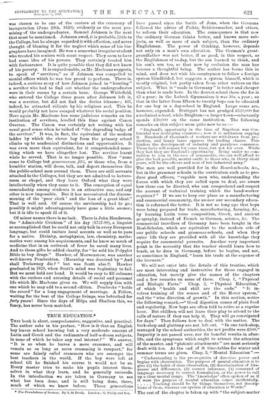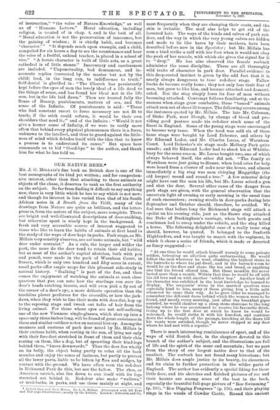TRUE EDUCATION.*
THIS book is short, comprehensive, suggestive, and practical. The author asks in his preface, "How is it that an English boy leaves school knowing but a very moderate amount of Latin and Greek and the rudiments of half-a-dozen subjects, in none of which he takes any real interest ? " We answer, "It is so when he leaves a mere crammer, and will remain so as long as mere cramming is rampant," for some are falsely called crammers who are amongst the best teachers in the world. If the boy were left at school till he finished his course it would not be so. Every master tries to make his pupils interest them- selves in what they learn, and he generally succeeds. In the introduction we are taken to Germany to see what has been done, and is still being done, there, much of which we knew before. Three generations • The Foundation' of Success. By S. de Broth. London; G. Pbilip and Son.
have passed since the battle of Jena, when the Germans followed the advice of Fichte, Schleiermacher, and others, to reform their education. The consequence is that now the ordinary German thinks better, and knows more sub- jects, as well as more of each subject, than the ordinary Englishman. The power of thinking, however, depends not only on a man's own education. The German's great- grandfather was not better, if as good, in this respect, as the Englishman of to-day, but the son learned to think, and his son's son too, so that now by evolution the man has become a thoughtful being. The author has borne this in mind, and does not wish his countrymen to follow a foreign system blindfolded, but suggests a system himself, which is mostly original, but partly taken from other writers on the subject. What is "made in Germany" is better and cheaper than what is made here. In the dearest school there the fee is E5 a year ; in the Lubeck Gymnasium it was 30s. a year ; so that in the latter from fifteen to twenty boys can be educated for one boy in a day-school in England. Large sums are, however, expended. Stuttgart has not grudged 2120,000 for a technical school, while Brighton—a larger town—reluctantly spends 00,000 on the same institution. The following remarks on this subject seem quite new to us :—
"England's opportunity in the time of Napoleon was Con- tinental war destroying commerce ; now it is militarism sapping it. Hundreds of thousands of workers are withdrawn from pro- duction, and heavy taxes oppress the trading classes. This hinders the development of industry and paralyses commerce. These facts will remain for some time, but not for over. While they last they are England's opportunity. Being under no com- pulsion to join in the race of armaments, she can well afford to give the best possiblg mental outfit to those who, in thirty short years, will be the officers and men of her industrial army."
The men are well provided for in the Board-schools, &c., but in the grammar schools is the curriculum such as to pro-
duce good officers, "capable men who, understanding the forces with which they are called upon to deal, are aware how these can be directed, who can comprehend and respect the amount of technical training which the hand-worker requires P" If we are to keep our place as a manufacturing and commercial community, the sooner our secondary educa- tion is reformed the better. It is not so long ago that boys were being prepared for trade, manufacturing, farming, &c., by learning Latin verse composition, Greek, and ancient geography, instead of French or German, science, &c. The commercial travellers of Germany have been taught in the Real-Schulen, which are equivalent to the modern side of our public schools and grammar-schools, and when they enter life they are provided with all the knowledge they require for commercial pursuits. Another very important point is the necessity that the teacher should learn how to teach, as he does in Germany, before he begins, and not, as sometimes in England, "learn his trade at the expense of the learners."
We will not enter into the details of this treatise, which are most interesting and instructive for those engaged in education, but merely give the names of the chapters and a few remarks on some of them. Chap. 1, "Physical and Biologic Facts." Chap. 2, "Physical Education," of which "health and skill are the ends." "It in- volves training of the senses and of the Motor system," and the "wise direction of growth." In this section, notice the following remark,—" Good digestion comes of plain food and regularity. Now boys are often told to retire at a regular hour. But children will not leave their play to attend to the calls of nature if they can help it. They will go constipated for days." Then follows how to deal with the matter. The tuck-shop and gluttony are not left out. "In one tuck-shop, managed by the school authorities, the net profits were f500."
Impurity is not passed over, nor its baneful results in after- life, and the symptoms which ought to attract the attention of the master, and "platonic attachments" are most seriously dealt with too. At the end of it time-tables for winter and summer terms are given. Chap. 3, "Mental Education"
"Understanding is the pre-requisite of directive power and begins with observation. The purpose of mental education is to give (1) the habit of close observation, (2) discrimination of like- nesses and differences, (3) correct inference, (4) command of language necessary to correct formulation, or the power to call up a clear mental image. The knowledge' often spoken of as if it were the purpose of mental education comes incidentally.
Teaching should be by things themselves, not descrip- tions of them, whereas our system of education is Words."
The rest of the chapter is taken up with "the subject-matter of instruction," "the value of Nature-Knowledge," as well as of "Humane Letters." Moral education, including religion, is treated of in chap. 4, and is the best of all. "Moral education is not the preservation of innocence, but the gaining of wisdom ; it is chiefly habit, and becomes character." "It depends much upon example, and a child, compelled for six hours a day to see the countenance and hear the voice of a fretful, unkind teacher, is placed in a school of vice." "A heroic character is built of little acts, as a great cathedral is of little stones." Inaccuracy and carelessness are included. " Unpunctuality, bad demeanour, and in- accurate replies (corrected by the master bat not by the child) lead, in the long run, to indifference to truth." Self-denial is glorified in : "The Church has persistently kept before the eyes of men the lovely ideal of a life dead to the things of sense, and has found her ideal not in the life won, but in the life laid down." Then are treated fully the Sense of Beauty, punishments, matters of sex, and the sense of the Infinite. Of punishments is said : "Those who find constant resort to force necessary are not fit to teach; if the stick could reform, it would be their own shoulders that need it;" and of the Infinite : "Would it not give a keener sense of 'Infinity, if we were to verify more often that behind every physical phenomenon there is a force, unknown to the intellect, and thus to guard against the little- ness of mind which deludes itself with the idea that to know a process is to understand its cause." But space here commands us to bid " Good-bye " to the author, and thank him for what he has told us.























































 Previous page
Previous page